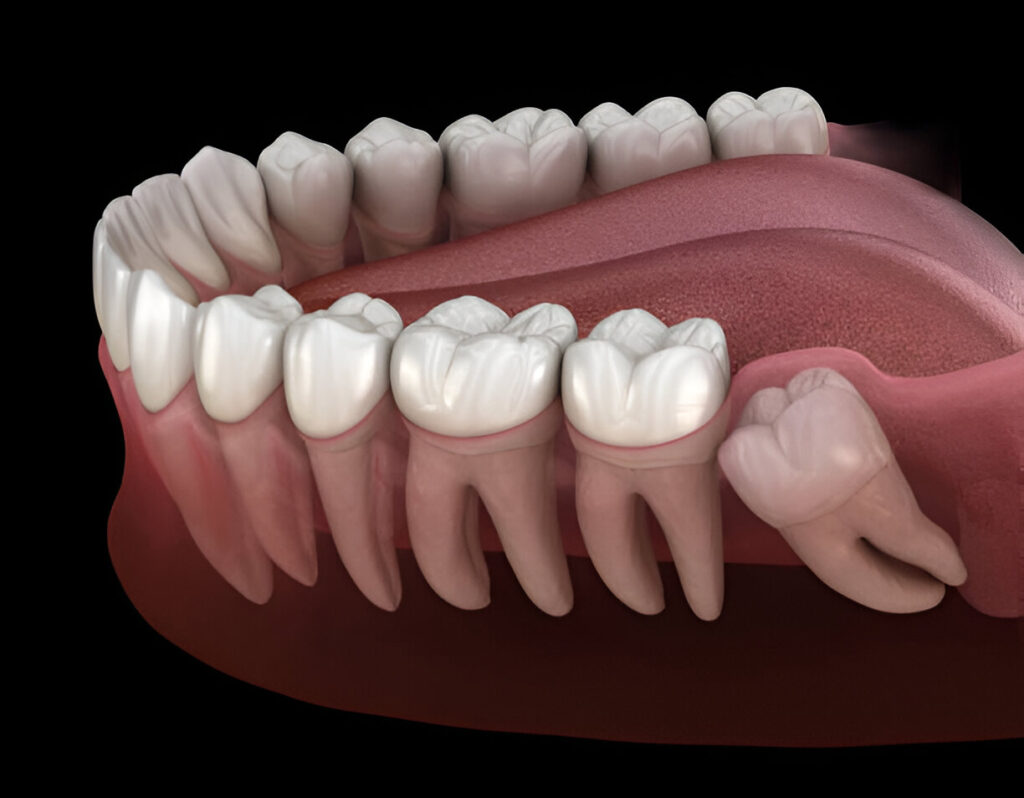Wisdom teeth, also known as third molars, usually appear between the ages of 17 and 25. These back teeth were once useful for chewing tough foods, but today, many people simply don’t have enough room in their jaws for them. This often leads to discomfort, crowding, or infection. But what if your wisdom teeth haven’t caused problems yet? Is there such a thing as “too late” to remove them? In this article, we’ll explore the best time for removal, what changes with age, and when you should speak to a dentist.
Why Are Wisdom Teeth Removed?
Wisdom teeth don’t always need to be removed. In some cases, they grow in straight and healthy and cause no issues. But often, they become impacted, meaning they don’t fully come through the gums or grow at an odd angle.
Impacted teeth can press against other molars, causing crowding or shifting. They can also trap food and bacteria, increasing the risk of infection, gum disease, and decay. Since these teeth are at the back of the mouth, they’re harder to clean, making them more likely to cause long-term problems if left untreated.
Do you lose face fat after wisdom teeth removal?
What’s the Ideal Age for Wisdom Tooth Removal?
Most dentists recommend removing wisdom teeth between the ages of 16 and 25. At this age, the roots of the teeth are not fully developed, and the bone in the jaw is softer. This makes the procedure easier and safer, with a faster recovery time.
Young adults also tend to heal more quickly and are less likely to experience complications, such as prolonged swelling or infection. For this reason, many people have their wisdom teeth taken out as a preventive step, even if there are no current symptoms.
What Changes as You Get Older?
As you get older, removing wisdom teeth becomes more complex. After the age of 30, the roots of the teeth are usually longer and more firmly set in the jawbone. The bone also becomes denser, which makes it more difficult for the oral surgeon to remove the teeth without disturbing nearby areas.
There’s also an increased chance that the roots are close to important nerves, especially in the lower jaw. If these nerves are disturbed during surgery, it could lead to numbness or tingling in the lips, chin, or tongue. Healing also takes longer, and older adults may experience more pain or swelling after the procedure.
Is It Risky to Have Your Wisdom Teeth Removed?
Is There a Cut-Off Age for Removal?
There is no exact age that is “too late” to remove wisdom teeth. However, many dentists agree that after the age of 40, removal should only be considered if there is a clear medical reason, such as infection, decay, or ongoing pain. In these cases, leaving the wisdom teeth in place could cause more harm than taking them out.
That said, some people in their 50s or even 60s may still benefit from having problematic wisdom teeth removed. If a tooth is infected or damaging nearby teeth, the benefits of removal may outweigh the risks, even at an older age. A careful check-up, including X-rays, can help determine the best choice for your situation.
Common Signs It’s Time to Remove Them
You may need to have your wisdom teeth removed if you notice any of the following:
- Persistent pain at the back of the mouth
- Swollen or bleeding gums around the molars
- Jaw stiffness or difficulty opening your mouth
- Infection, including bad breath or a bad taste
- Damage to neighbouring teeth
- Shifting or crowding of other teeth
- Development of cysts or small tumours in the jaw
Even if your wisdom teeth aren’t painful, they can still cause hidden problems under the gumline. Regular dental check-ups are important to catch these issues early.
Does Removing Wisdom Teeth Change Face Shape?
What If There Are No Symptoms?
Some people live with their wisdom teeth for years without any symptoms. If your wisdom teeth are fully grown in, healthy, and easy to clean, you may never need them removed. However, at a polyclinic in Dubai, your dentist may spot early signs of crowding or damage during routine X-rays and recommend removal to prevent future issues.
For many adults, ongoing monitoring through regular dental check-ups at a trusted polyclinic in Dubai is a sensible alternative to surgery—especially when the teeth aren’t currently causing discomfort or harm.
Can I Eat After Wisdom Teeth Removal?
What to Expect After Surgery at an Older Age
If you do need wisdom teeth removed later in life, be prepared for a slightly longer recovery. Swelling, bruising, and pain may last for several days. You may need extra time off work or help at home, especially if multiple teeth are removed at once.
Following your dentist’s aftercare instructions is key. This includes eating soft foods, keeping the mouth clean, and avoiding smoking or drinking through straws during healing. Older adults may also be asked to stop certain medications or manage health conditions like diabetes before surgery.
Is wisdom teeth removal painful?
Conclusion
So, when is it too late to remove wisdom teeth? The answer depends on your unique situation. While it’s easier to remove wisdom teeth between 16 and 25, it’s not necessarily “too late” after that. In your 30s or 40s, the procedure may be more complex, but still very possible. Beyond 40, removal is usually reserved for when symptoms or risks make it necessary.
The best advice? Don’t wait until there’s a problem. If you’re unsure whether your wisdom teeth should come out, book a dental exam. With the right care and timely advice, you can avoid unnecessary pain and protect your oral health for years to come.
Book Your Wisdom Tooth Consultation at YAH Polyclinic
If you’re wondering whether it’s too late to remove your wisdom teeth, our experienced dental team at YAH Polyclinic is here to help. We provide thorough assessments using modern imaging, expert advice, and safe, effective care tailored to your age and oral health needs.
Whether you’re in your 20s or well into your 40s, it’s never too late to take action.
Book your consultation with YAH Polyclinic today and take the first step towards a healthier, pain-free smile.
Frequently Asked Question
Is there an age limit for removing wisdom teeth?
There’s no strict age limit, but removal is usually easier between ages 16 and 25. After age 40, dentists often recommend removal only if symptoms occur, as healing slows and risks increase.
What happens if you never remove your wisdom teeth?
If left in place, wisdom teeth can crowd other teeth, cause decay, or lead to gum infections. Regular dental check-ups are vital to catch problems early, even if you’re symptom-free.
Is it safe to remove wisdom teeth after 30?
Yes, but the procedure may be more complex. Older patients may experience longer recovery, denser jawbone, and increased surgical risks. It’s important to follow post-op instructions closely.
Can wisdom teeth be left in if they aren’t causing pain?
Yes. If they are healthy, fully erupted, and easy to clean, your dentist may recommend monitoring rather than removal. However, regular X-rays are needed to check for hidden issues.
How long does recovery take for older adults after extraction?
Recovery can take slightly longer in adults over 30. Swelling and discomfort may last up to a week or more. Following aftercare advice helps reduce the chance of complications.





